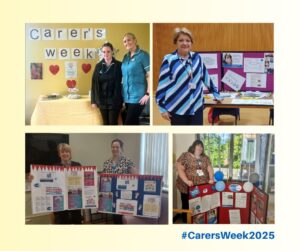Carers across our Trust’s region are today being put front and centre with the launch of Carers Week 2025.
The nationwide campaign aims to raise awareness of caring, highlight the challenges unpaid carers face and recognise the contribution made by carers to families and communities.

This year the theme is Caring about Equality, highlighting the inequalities faced by unpaid carers – and how we can help create a fairer society for carers.
“Carers are at greater risk of experiencing poor mental and physical health, social isolation, financial hardship, and poverty,” said Trust health and wellbeing lead Helen Cooke.
“They play a vital role in our communities, but can miss out on opportunities in education, careers or personal lives because of their caring responsibilities.”
Caring for our carers
Around six million people are involved with unpaid caring work across Britain – looking after friends or loved ones who, due to illness or disability, cannot cope without support.
“Juggling employment and caring can be challenge and lead to people making changes at work, such a reducing their hours or taking a less demanding role,” said Helen.
“Some people even have to give up work to care. These factors can impact on the income of carers, future pensions and their ability to save for the future.”
Health and wealth inequalities
Some of the inequalities carers face include:
- 70% of carers have a long-term physical or mental health condition, disability or illness compared to 59% of non-carers.
- Many carers struggle to take a break, feeling isolated or overwhelmed.
- The poverty rate for carers is 50% higher than for people who do not provide care.
- Young adult carers are 38% less likely to gain a university degree than their peers.
- 1 in 4 carers of working carers have had to take on a lower paid or more junior role.
- Carers can also often find it hard to find time to spend with their friends and family, with one-in-two carers experiencing loneliness.
“Carers can be a crucial form of support for individuals with enduring mental illness, however carers also require support,” said Anthea Motson, Trust patient and carer experience officer.

“Carers desperately need to feel like they are being listened to, and one of the most powerful things we can do is just listen.
“They can help us to see the things we don’t see; see things that are really important and help us to start from the right place. It’s the small things that can make a huge difference.
“Carers Week is our chance to give recognition and respect to all carers, both the working ones within our Trust and those we work alongside,” said Anthea.
Valuing our carers
It is estimated that unpaid carers save the economy more than £162 million a year – and each day 6,000 people in the UK start looking after someone close to them, unpaid.
The dedicated support that unpaid carers provide day in, and day out, has been valued as the equivalent of a second NHS – yet many still don’t receive the support they also need.
“We want carers to know they are valued,” said Anthea.
“Many might not think of themselves as having caring responsibilities, or identify as carers, which means they might miss out on support. We hope Carers Week helps to highlight this.”
- Advice on accessing support for carers is available on our website. The carers hub web pages have been co-created for and by unpaid carers.